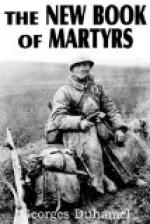He sees again the listening post where he spent the night, in advance of all his comrades. He sees again the narrow doorway bordered by sandbags through which he came out at dawn to breathe the cold air and look at the sky from the bottom of the communication-trench. All was quiet, and the early summer morning was sweet even in the depths of the trench. But some one was watching and listening for the faint sound of his footsteps. An invisible hand hurled a bomb. He rushed back to the door; but his pack was on his back, and he was caught in the aperture like a rat in a trap. The air was rent by the detonation, and his legs were rent, like the pure air, like the summer morning, like the lovely silence.
The days pass, and once more, the coursing blood begins to make the vessels of the neck throb, to tinge the lips, and give depth and brilliance to the eye.
Death, which had overrun the whole body like an invader, retired, yielding ground by degrees; but it has halted now, and makes a stand at the legs; these it will not relinquish; it demands something by way of spoil; it will not be baulked of its prey entirely.
We fight for the portion Death has chosen. The wounded Corporal looks on at our labours and our efforts, like a poor man who has placed his cause in the hands of a knight, and who can only be a spectator of the combat, can only pray and wait.
We shall have to give the monster a share; one of the legs must go. Now another struggle begins with the man himself. Several times a day I go and sit by his bed. All our attempts at conversation break down one by one. We always end in the same silence and anxiety. To-day Leglise said to me:
“Oh! I know quite well what you’re thinking about!”
As I made no answer, he intreated:
“Perhaps we could wait a little longer? Perhaps to-morrow I may be better ...”
Then suddenly, in great confusion:
“Forgive me. I do trust you all. I know what you do is necessary. But perhaps it will not be too late in two or three days. ...”
Two or three days! We will see to-morrow.
The nights are terribly hot; I suffer for his sake.
I come to see him in the evening for the last time, and encourage him to sleep. But his eyes are wide open in the night and I feel that they are anxiously fixed on mine.
Fever makes his voice tremble.
“How can I sleep with all the things I am thinking about?”
Then he adds faintly:
“Must you? Must you?”
The darkness gives me courage, and I nod my head: “Yes!”
As I finish his dressings, I speak from the depths of my heart:
“Leglise, we will put you to sleep to-morrow. We will make an examination without letting you suffer, and we will do what is necessary.”
“I know quite well that you will take it off.”
“We shall do what we must do.”




